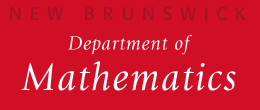This page contains information of special interest to international applicants. All prospective applicants should read the other pages related to graduate admissions.
About 40% of the students in our program are "international" (non-U.S.) students and some of our very best students have been such students. We welcome inquiries and applications from any interested individuals. We recognize that educational programs differ in other countries, and we are happy to have successfully enabled well-qualified students from countries in Africa, Asia, Europe, and Latin America to earn Ph.D.'s. (And from Australia and Canada!)
All international students admitted for Ph.D. studies are provided with financial support (usually in the form of a teaching assistantship), unless the student has an external source of funds. Financial support is continued in future years contingent on satisfactory progress and availability of funds. Nearly all of our students who need support are able to obtain it throughout their studies.
Once a student is admitted, the Graduate Admissions Office usually issues an initial authorization (most frequently, an I-20 form) for admitted applicants to enter the U.S. These authorizations must be accompanied by sufficient financial resources. Support awards administered by the Graduate Program generally meet this financial requirement.
International students at Rutgers
Rutgers-New Brunswick
is located in central New Jersey, a part of the
United States whose population includes a significant number of
residents with origins in many parts of the world. One satisfying
result is that food stores and restaurants with a very wide variety of
choices are easily accessible! The composition of the undergraduate
and graduate student body at Rutgers reflects the extremely varied
nature of the local population and the worldwide reputation of
Rutgers scholarship. There are numerous organizations and activities
on campus representing the diverse heritage of groups of students.
The regulations governing study and work here by international students are complex. People at the International Center are specially trained to help students and other university visitors follow these rules. They must be followed since neither the staff of the Center nor of the Department of Mathematics can alter the laws and regulations of the United States. In particular, students must be sure that their documentation is correct before they travel in and out of the U.S. Different regulations regarding work and residency may apply when students graduate. The staff of the International Center will know the current regulations and can help students deal with problems.
The International Center usually has meetings at the beginning of the academic year which are extremely useful. These meetings deal with such topics as entering the Social Security system, which is essential for receiving payments in the U.S.
English language proficiency
Admitted students must demonstrate English language proficiency by attaining a satisfactory score on one of the approved proficiency tests.
Admitted students may be required to take a test of English proficiency soon after arrival at the university and may be obligated to take course work in English as a Second Language (ESL). New international students appointed as teaching assistants are required to take an oral proficiency test regardless of their TOEFL scores. Such competence is ordinarily assessed by the Rutgers ESL program. An initial appointment as a teaching assistant (TA) may not require classroom duties. Reappointment as a TA in mathematics generally does require work as a classroom instructor. Such appointments cannot be made until ESL has certified that the candidate possesses adequate competence in oral English (both speaking and understanding the spoken language). In some cases ESL will grant provisional certification conditioned on continuing work in their courses.
Our qualifying exams are given in English, and it is the language of instruction at Rutgers. A student with a low level of competence in English may find that this affects their performance on these exams. Thus non-native speakers of English are urged strongly to talk about mathematics in English with other students! Constant practice in conversational English in and out of class will eventually ease the difficulties some non-native English speakers may have.








